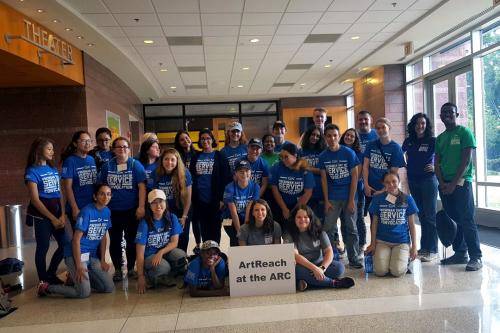Service Learning & Sustainability
Alongside the traditional laboratory experience, the Department of Biological Sciences values service-based education that connects students with their community and fosters a sense of responsibility for the environment.
Some of the most popular undergraduate biology courses rely on faculty-led sustainability and service initiatives. Interested students also have the opportunity to study sustainable science in more depth with a minor.
Service Learning
Service learning gives perspective and context for material learned in the classroom, connects academics with volunteering and helps students develop practical professional tools like interpersonal and communication skills. Students graduate with a deeper understanding of how to apply what they learn in the classroom to working life.
One of the department's major current service learning projects is a grant-based collaboration through GW ArtReach, THEARC Theatre and the Washington School for Girls. GW ArtReach, based out of THEARC Theatre, is a program that offers free community art-based classes and pop-up art galleries throughout the area to promote cross-cultural understanding, college preparation and therapeutic respite in underprivileged communities.
Service Learning in Action
The Biology Behind Nutrition Labels
In The Biology of Nutrition and Health, students learn to prioritize nutrition on a budget and connect the foods they eat with overall health. As part of the course, students work with community groups, children and after-school programs to tackle real-world economic and health problems.
Sustainability
Sustainability is one of GW’s nine core values. The university holds a gold ranking from the Association for the Advancement of Sustainability in Higher Education (AASHE), and hundreds of sustainability-related courses are offered across the university at the undergraduate and graduate levels. Unlike other institutions — where sustainability is housed in a single college or school — at GW, sustainability is a university-wide collaboration overseen by the provost and involving faculty from all colleges and schools. Harlan Greenhouse staff and volunteers have restored local native plant habitats, renovated a community garden at Drew Elementary School in Northeast D.C. and donated GW-grown vegetables, herbs and greens to Miriam’s Kitchen to help feed the homeless.
Interdisciplinary Minor in Sustainability
Sustainability in Action
Growing Plants, Enriching the Community
Staff from the Wilbur V. Harlan Greenhouse pitched in with a green landscape restoration project in Ward 8 of Washington, D.C. More than 3,000 native grasses and wildflowers grown in the greenhouse were planted in an abandoned lot behind the THEARC Theatre. With the help of a D.C. Department of Energy and the Environment grant, greenhouse staff organized monthly volunteer days to clean up the area's Oxen Run Stream and create nearby paths. By April 2018, a total of 4,552 pounds of trash had been removed from the stream. This site has been dubbed The Living Classroom and is now used for outdoor education on the importance of native species, ecosystem services and clean water.







